If Julian Assange is extradited he will face prosecution under a severe espionage law with roots in the British Official Secrets Act that is part of a history of repression of press freedom, reports Joe Lauria.
A Long History of US Repression of a
Free Press, Despite the Constitution
1950 Amendment Made ‘Practically Every Newspaper in the US and All Publishers, Editors and Reporters into Criminals Without Their Doing Any Wrongful Act’
‘
By Joe Lauria
Special to Consortium News
Originally published April 11, 2021
 From its earliest years the United States has found ways to deny the rights of a free press when it was politically expedient to do so.
From its earliest years the United States has found ways to deny the rights of a free press when it was politically expedient to do so.
One of the latest ways was to arrest WikiLeaks publisher Julian Assange four years ago today and to indict him — the first time a publisher and journalist has ever been charged under the 1917 Espionage Act for possessing and publishing state secrets.
Though two U.S. administrations came close to punishing journalists for revealing defense information, they both failed, until Assange.
A major hurdle for the government is overcoming the conflict between the Espionage Act and the First Amendment, which prohibits Congress from passing any law, including the Act, that abridges press freedom.
Until that legal conflict is resolved in court, resulting in parts of the Espionage Act being found unconstitutional, the language of the Act threatening press freedom remains.
Bolstered by 1950 amendments to the Act, the Donald Trump administration crossed a redline to arrest a journalist. A 1961 amendment made it possible to indict a non-U.S. citizen, acting outside U.S. territory.
The Trump administration’s first indictment of a publisher opened an alarming precedent for the future of journalism.
President Joe Biden’s Department of Justice has not reversed Trump’s move to continue to seek Assange’s extradition from Britain though it could have.
Instead it appealed Judge Vanessa Baraitser’s January 2021 decision not to extradite Assange to the U.S. on health grounds and because of the onerous conditions of U.S. prions. The Biden administration won its appeal, convincing the High Court in London to believe its promises that it would not mistreat Assange.
The publisher has launched a new appeal to the High Court on several new grounds, including that the U.S. prosecution is politically motivated (a political offense bars extradition in the U.S.-U.K. treaty) and that Assange’s prosecution violates his right to free speech.
If Assange ultimately loses his appeal he would be brought to the Eastern District of Virginia to face 17 Espionage Act counts, amounting to 175 years in prison. Baraitser challenged none of those counts in her judgement.
Threats to press freedom are an integral part of U.S. history. Assange’s arrest and indictment comes within a long line of government repression of a free press, first by the British against American colonists, and then by the U.S. government, which based the Espionage Act on the British Official Secrets Act.
Possession and Dissemination
Assange did not pass state secrets to an enemy of the United States, as in a classic espionage case, but rather to the public, which both the U.S. and British governments might well consider the enemy.
Assange revealed crimes and corruption by the state. Punishing such legitimate criticism of government historically amounted to a charge of sedition, but two sedition acts were repealed in the U.S. shortly after they were made law and are no longer on the books.
Other journalists and publishers in the past have been prosecuted under the Espionage Act, but mostly for criticizing and trying to curtail the military draft during the First World War.
Assange became the first journalist prosecuted under sections of the Act that make it a crime to have (or even attempt to have) unauthorized possession of defense material, and separately, to communicate it, since technically neither he nor anyone working for WikiLeaks were authorized to do so.
The language used in his indictment based on the Espionage Act is so broad that theoretically anyone who has shared a classified WikiLeaks publication on social media could also be liable to prosecution, not to mention the many mainstream media organizations that routinely report on and quote from classified material, including from WikiLeaks.
The overly broad language means the government does not generally have to prove that the intent was to harm the U.S., only that a defendant, in this case Assange, knew it could.
Neither does the possession and publication of classified information have to cause any actual harm to the U.S. The government does not need to prove that publication actually threatened national security.
Intent, Retention, Communication & Person
The main issues involving Assange’s Espionage Act indictment and the history of Anglo-American espionage legislation are: a) intent: whether motive is relevant to prosecution and whether a public interest defense is possible; b) person: who is liable for prosecution, whether only government officials, normally the source of leaked secrets, or anyone, including journalists who publish them; c) retention: whether mere unauthorized possession is a crime; and d) communication: the laws as they have regarded unauthorized communication of defense information.
These four aspects of espionage laws on both sides of the Atlantic evolved in numerous complex ways over the century between 1889 and 1989, in particular how they have affected journalism. But earlier governments also found ways to choke off press freedom.
A History of Prosecuting Speech
While Assange is the first journalist indicted for possessing and disseminating classified information there is a long history of prosecuting speech in America.
The classic case of a publisher being prosecuted for publishing material critical of a government authority, on the territory of what would become the United States, took place in 1735 in the British colony of New York.
William Cosby, the governor of the colony, put John Peter Zenger, publisher of The New York Weekly Journal on trial for printing an article accusing Cosby of rigging elections and other corruption.
Though the judge ordered that Zenger be found guilty based on the libel law at the time (which criminalized criticism of the government even if true) the jury acquitted Zenger, arguing that the law was unjust. This historic case of jury nullification paved the way for the First Amendment after the American Revolution.
“Morris called Zenger’s case ‘the germ of American freedom … which subsequently revolutionized America.’”
If Assange were to be extradited and go on trial in Alexandria, Virginia, a jury ignoring the Espionage Act’s repressive restrictions on press freedom could be Assange’s best hope for freedom. Such an event could also pave the way for a successful constitutional challenge of the law on First Amendment grounds.
Genesis of First Amendment
The Zenger case was referred to 52 years later in the 1787 U.S. Constitutional Convention by Gouverneur Morris, a New York signer of the Declaration of Independence. Morris called Zenger’s case “the germ of American freedom, the morning star of that liberty which subsequently revolutionized America.” One of the many parts of British common law American rebels opposed was that truth was no defense in a libel case.
Though the Virginia colonial legislature had passed a Declaration of Rights in 1776 that included the line, “The freedom of the press is one of the greatest bulwarks of liberty, and can never be restrained but by despotic Governments,” and though eight of the other 12 colonies passed similar language, there was resistance to this and other parts of a declaration of rights being adopted at the Constitutional Convention.
After more than three years of debate, the Bill of Rights was added to the Constitution in December 1791. The first of these rights says:
“Congress shall make no law respecting an establishment of religion, or prohibiting the free exercise thereof; or abridging the freedom of speech, or of the press; or the right of the people peaceably to assemble, and to petition the Government for a redress of grievances.”
1798 Sedition Act
Just eight years after the adoption of the Bill of Rights, press freedom had become a threat to John Adams, the second president, whose Federalist Party pushed through Congress the Alien and Sedition Laws. They criminalized criticism of the federal government:
“To write, print, utter or publish, or cause it to be done, or assist in it, any false, scandalous, and malicious writing against the government of the United States, or either House of Congress, or the President, with intent to defame, or bring either into contempt or disrepute, or to excite against either the hatred of the people of the United States, or to stir up sedition, or to excite unlawful combinations against the government, or to resist it, or to aid or encourage hostile designs of foreign nations.”
Congress did not renew the Act in 1801 and President Thomas Jefferson pardoned prisoners serving sentences for sedition and refunded their fines.
Prosecuting the Press in the US Civil War
Freedom of the press next came significantly under attack in the lead up to the 1860-65 U.S. Civil War. Newspaper editors who campaigned for the abolition of slavery were attacked by mobs, sometimes directed by elected officials. More than 100 mobs attacked abolitionist newspapers. In 1837 an editor was killed by a mob, one of whose organizers was the Illinois attorney general.
During the war numerous editors and journalists were arrested in the North. “Throughout the war, newspaper reporters and editors were arrested without due process for opposing the draft, discouraging enlistments in the Union army, or even criticizing the income tax,” according to the First Amendment Encyclopedia.
Grand juries in New York and New Jersey presented a list of newspapers condemned for calling the conflict an “unholy war.” The Post Office was ordered to stop delivering those newspapers and “U.S. marshals in Philadelphia seized copies of the listed newspapers as they arrived by train.”
The encyclopedia says,
“In the vast majority of instances, the government restrained the free press without any legal process. The military routinely arrested newspaper editors and closed their presses; military tribunals banished some of them to the Confederacy for encouraging resistance.”
Secretary of State William Seward ordered the arrest of an editor from the Freeman’s Journal for allegedly treasonous statements and Secretary of War Edwin Stanton “authorized a military governor to destroy the office of the Sunday Chronicle in Washington.”
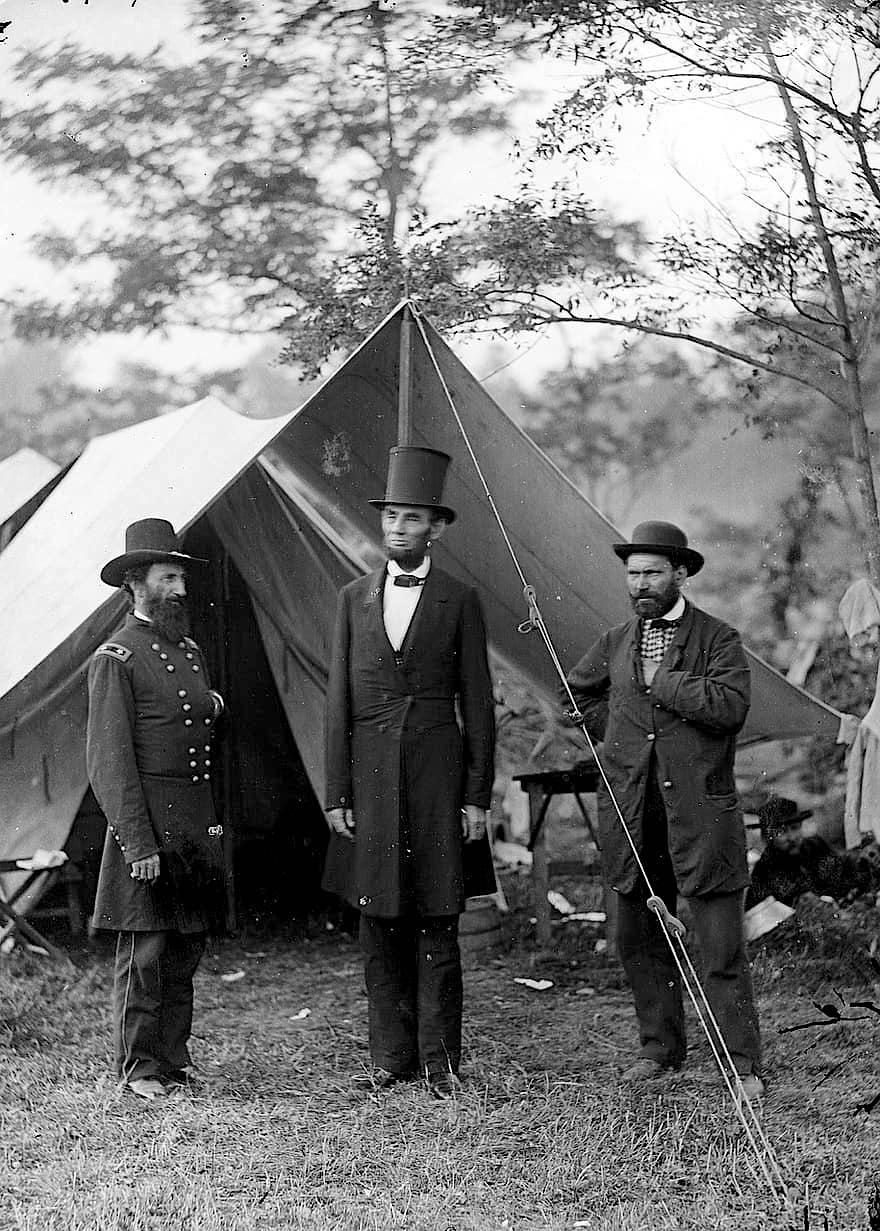
Allan Pinkerton, Lincoln and Gen. John McClendand. (Mathew Brady Photographs of Civil War-Era Personalities and Scenes, 1921 – 1940 Record Group 111: Records of the Office of the Chief Signal Officer, 1860 – 1985)
President Abraham Lincoln was faced with a dilemma, which he posed in a July 1861 speech: “Must a government of necessity, be too strong for the liberties of its own people, or too weak to maintain its own existence?” In trying to strike a balance, Lincoln reversed an order by Gen. Ambrose Burnside to suspend the Chicago Times and criticized Gen. John Schofield for arresting the editors of the Missouri Democrat.
The greater concern was that Confederate generals read Northern newspapers to learn of Union troop movements, an issue that would appear 50 years later in the Espionage Act. In 1862 Lincoln set up military trials for people agitating against the military draft, an issue that would also be later codified into the Act.
1889 Official Secrets Act & the Provenance of the Espionage Act
The 1917 U.S. Espionage Act under which Assange is charged is descended from the 1889 British Official Secrets Act. The Espionage Act replaced the 1911 U.S. Defense Secrets Act, which was based on Section 1 of Britain’s legislation, the Official Secrets Act of 1889.
The language of this section of the Defense Secrets Act is in places nearly identical with the Official Secrets Act. Some of that language has survived in the Espionage Act to ensnare Assange.
The 1889 British Official Secrets Act says:
While the 1911 U.S. Defense Secrets Act says:
1889 Official Secrets Act
The 1889 Official Secrets Act was enacted in the midst of continuing unrest in Ireland and British tension with Russia over Afghanistan, hyped by exaggerated press reports of Russian designs on British India. It was also an era of freelance British spies abroad in the empire. The Act came 16 years after the establishment of the Intelligence Branch at the British War Office. Prior to 1889, larceny was the only law against obtaining and disclosing government secrets.
One of the cases that may have led directly to the Act was that of Charles Marvin, a clerk at the Foreign Office, who supplemented his income by freelancing articles to a newspaper. In one 1878 piece he reproduced from memory a secret British treaty with Russia, but the case against him was dismissed because he never physically removed the document from the Foreign Office. If Marvin were indeed the catalyst for the Official Secrets Act, it can be said that it came about to stop a journalist in the future from illegally obtaining and publishing state secrets.
The 1889 Act “is a classic piece of Victorian legislation, clear in some ways, vague in others, but significantly more liberal than what followed,” said Consortium News legal analyst Alexander Mercouris. “Section 1 of the 1889 Act is clearly concerned with spying, though the language is sufficiently vague that in theory it could be stretched to include other forms of disclosure. However I doubt that Victorian judges would have allowed it to be used for purposes other than prosecuting genuine acts of spying.”
Significantly, the 1889 Act included an explicit public interest defense, but only for government employees.
“Where a person, by means of his holding or having held an office under Her Majesty the Queen, has lawfully or unlawfully either obtained possession of or control over any document … at any time corruptly or contrary to his official duty communicates or attempts to communicate that document … to any person to whom the same ought not, in the interest of the State, or otherwise in the public interest, to be communicated at that time, he shall be guilty of a breach of official trust.” (Emphasis added.)
The public interest defense was added to the bill after objections were made in Parliament that the Act might penalize disclosures of government corruption and misconduct.
Section 1 of the Act criminalized any person for mere unauthorized possession and even unauthorized “knowledge” of any secret information (this clearly to prevent memorization of secrets, as Marvin had done). It also made it a crime to communicate such information to an unauthorized person. Even an attempt to do these things was a crime. Assange would have technically been liable under this part of the Act without a public interest defense, as he is not a government employee.
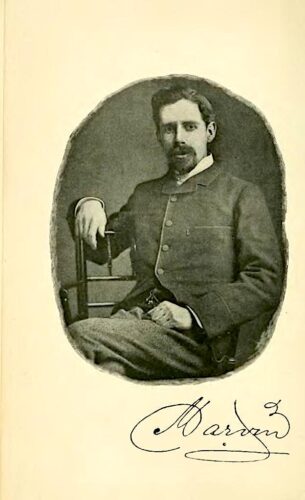
Charles Marvin. (From his 1883 book The region of the eternal fire; an account of a journey to the petroleum region of the Caspian. London, W.H. Allen & Co. University of California Libraries, digitalized by MSN Books.)
Section 2 related only to government officials, who would be guilty of a breach of trust if that official “corruptly or contrary to his official duty communicates or attempts to communicate that document, sketch, plan, model, or information to any person to whom the same ought not to be communicated at that time.”
Anyone “inciting” or “counseling” another person to commit an offense under the Act could also be prosecuted. First introduced here, the offense of “incitement” has survived in the current U.S. Espionage Act and was part of the charge against Assange, who is accused of having “knowingly and unlawfully obtained and aided, abetted, counseled, induced, procured and willfully caused [Chelsea] Manning to obtain documents…”
Jurisdiction of the 1889 Act was limited to “Her Majesty’s dominions,” though government officials could be prosecuted for violations anywhere in the world. Mere possession and communication were misdemeanors, while passing state secrets to a foreign nation was a felony.
This first espionage law, which formed the basis of all such laws that would follow in the U.S., Britain and the Commonwealth (including the espionage law in Assange’s native Australia) made it a crime (even for the press) to possess state secrets without authority and to communicate those secrets. Subsequent versions in Britain and the U.S. refined and reinforced this basic theme, with some important changes.
1911 U.S. Defense Secrets Act
Before the 1911 U.S. Defense Secrets Act, the only U.S. laws against espionage were those relating to treason, theft of government property and unlawful entry onto a U.S. military base.
Just three paragraphs long, the language contained in the Defense Secrets Act is closely aligned with the Official Secrets Act. Section 1 of the DSA covers any person “obtaining” defense information “to which he is not lawfully entitled.” Anyone who “receives or obtains” such information “without proper authority” also broke this law.
A person who “willfully” and without authority “communicates or attempts to communicate” such information to “any person not entitled to receive it” was in breach of the Act. Section 2 spells out a ten year prison sentence if secrets were passed to a foreign government.
1911 Official Secrets Act
In October 1909 the Secret Service Bureau was created by the Foreign Office, the War Office and the Admiralty to deal primarily with “an extensive system of German espionage.” The bureau was split into the domestic service, MI-5, and foreign, MI-6. Both agencies today acknowledge that the German espionage scare that led to their creation was mostly media hype. The MI-5 website says:
“‘Refuse to be served by a German waiter’, the Daily Mail advised its readers. ‘If your waiter says he is Swiss, ask to see his passport.’ Such alarmism reflected the tensions caused by the Anglo-German naval arms race and the approach of the First World War. Most of the ‘spies’ who persuaded Whitehall that it was faced with ‘an extensive system of German espionage’ in Britain were figments of the media and popular imaginations.”
Nonetheless, just two years after the bureau’s creation, and six months after the passage of the U.S. Defense Secrets Act, the British parliament reenacted in a single day after one hour of Commons debate its revised Official Secrets Act on Aug. 22, 1911. MP Sir Alpheus Morton said it was “very unusual and a very extraordinary thing to pass such a Bill without an opportunity of discussing it. Although I do not wish to insist upon the point, I submit that all the stages of a Bill ought not to be dealt with in this House without a proper opportunity of discussing every Clause.”
Removed from the 1889 Act was the explicit mention of a public interest defense.
The 1911 Official Secrets Act also added an alarming Section 2, which was not discussed at all in Parliament or the press before passage, saying it was no longer necessary to prove one’s guilt — the appearance of a crime was enough.
“(2) On a prosecution under this section, it shall not be necessary to show that the accused person was guilty of any particular act tending to show a purpose prejudicial to the safety or interests of the State, and, notwithstanding that no such act is proved against him, he may be convicted if, from the circumstances of the case, or his conduct, or his known character as proved, it appears that his purpose was a purpose prejudicial to the safety or interests of the State…”
Section 1 of 1911 OSA applies to “any person” who “obtains or communicates” a state secret “calculated to be,” “might be” or is “intended to be directly or indirectly useful to an enemy.” This extraordinarily broad language criminalized any person who merely “approaches or is in the neighbourhood of, or enters any prohibited place within the meaning of this Act” for any “purpose prejudicial to the safety or interests of the State.”
The burden of proof shifted to defendants from prosecutors who no longer had to prove the 1889 requirement that the defendant’s motive was prejudicial to the state. Any official document that was obtained was deemed “prejudicial to the interests of the state … unless otherwise proved.” This went beyond anything in the Defense Secrets Act.
Reception of a secret was a crime by any person “unless he proves that the communication to him of the sketch, plan, model, article, note, document or information was contrary to his desire.” A 1920 amendment to the Act made “wrongful communication or retention of official documents” an offense — the first time “retention” was mentioned and made a crime in a U.S. or British espionage law. This led Viscount Burnham to warn during the amendment’s House of Lord’s debate:
“I do not know a single editor of a national paper who from time to time has not been in possession of official documents which have been brought into his office, very often not at his own request, and which it may be inconvenient to the Minister of the responsible Department should have gone out.”
Sir Donald Maclean MP argued in the House that the amendments threatened a free press. “I find it difficult to confine my language in regard to this Bill within the range of Parliamentary propriety. It is another attempt to clamp the powers of war on to the liberties of the citizen in peace,” he said.
Though the main intention of the Act was geared towards foreign espionage, the term “any person” in these two British and one American Act in no way excluded the prosecution of a journalist, the subject of a 1938 London conference on the “Freedom of the Press and the Challenge of the Official Secrets Acts.”
In a speech to the conference, Dingle Foot, who would later become a member of Parliament and solicitor general, said: “These Acts now constitute a sort of statutory monstrosity abrogating nearly all the usual rules for the protection of accused persons and there is nothing to compare with them anywhere else in our criminal law.”
Although Assange was the first indicted under the U.S. law, British journalists had already been indicted for publishing state secrets. In 1971 reporters and editors at The Sunday Telegraph were prosecuted under the 1911 Official Secrets Act for publishing Foreign Office documents about British policy in the civil war in Nigeria. The government lost at trial as the material was shown to have been merely embarrassing to the government.
In 1978 two British journalists were indicted under the 1911 Official Secrets Act in the so-called ABC Trial for publishing an article in the magazine Time Out about wiretapping by the signals intelligence agency GCHQ. Section 1 charges were dropped by the judge at trial for being “oppressive in the circumstances,” but the two journalists, John Berry and Duncan Campbell, were convicted in the Old Bailey under section 2, though they received minimal sentences.
The anti-German mania, which was the backdrop to both the U.S. Defense Secrets and British Official Secrets Acts — passed within six months of each other in 1911 — helped set the stage for the Great War, which broke out three years later.
The Espionage Act
In his 1915 State of the Union address, in the midst of the First World War, but before the U.S. entered it, President Woodrow Wilson made a strident and authoritarian argument for the Espionage Act. He said:
“There are citizens of the United States, I blush to admit, born under other flags but welcomed under our generous naturalization laws to the full freedom and opportunity of America, who have poured the poison of disloyalty into the very arteries of our national life; who have sought to bring the authority and good name of our Government into contempt, to destroy our industries wherever they thought it effective for their vindictive purposes to strike at them, and to debase our politics to the uses of foreign intrigue…
I urge you to enact such laws at the earliest possible moment and feel that in doing so I am urging you to do nothing less than save the honor and self-respect of the nation. Such creatures of passion, disloyalty, and anarchy must be crushed out. They are not many, but they are infinitely malignant, and the hand of our power should close over them at once. They have formed plots to destroy property, they have entered into conspiracies against the neutrality of the Government, they have sought to pry into every confidential transaction of the Government in order to serve interests alien to our own. It is possible to deal with these things very effectually. I need not suggest the terms in which they may be dealt with.”
On the very day Wilson asked Congress to declare war on Germany, Sen. Charles Allen Culberson, a Texas Democrat, introduced the Espionage Act bill to the Senate.
Formal Censorship Rejected
While the Espionage Act does not impose formal government censorship, its use against Assange is having a chilling effect on the press and the spirit, if not the letter, of the First Amendment. While the Pentagon Papers case, as we’ll see, showed that the government cannot exercise “prior restraint” — that is, ordering a publisher beforehand not to publish classified material — it can prosecute a publisher or journalist after publication.
If Wilson had had his way, however, prior restraint — or formal government censorship — would have become legal. He sent Congress a version of the Espionage Act that explicitly called for it.
There was a furious reaction against it in the press.
A June 1919 article in the Michigan Law Review reported:
“Said The MILWAUKEE NEWS … The Censorship bill . . . has aroused such a storm of dis- approval that the President seeks to allay popular indignation at this glaring attempt to void Constitutional rights. . . . The whole program to muzzle the press seems to smack of unconstitutionality, tyranny, and deceit.’
“The NEW YORK TIMES, too, was greatly alarmed, and devoted a considerable part of its editorial space throughout several days to criticism of the measure and especially of its alleged unconstitutionality.”
After just one week of debate, the Senate was sufficiently alarmed that it voted 39 to 38 to remove the section on censorship. A single Senate vote stopped formal U.S. censorship.
The Espionage Act bill was passed by the House on May 4, 1917, by 261 votes to 109 and by the Senate on May 14 by a vote of 80-8. Passage in the Senate came with a warning from Democratic Sen. Charles Spalding Thomas of Colorado, who said: “I very much fear that with the best of intention we may place upon the statute books something that will rise to plague us in the immediate future.” He added:
“Of all times in time of war the press should be free. That of all occasions in human affairs calls for a press vigilant and bold, independent and uncensored. Better to lose a battle than to lose the vast advantage of a free press.”
“‘The whole program to muzzle the press seems
to smack of unconstitutionality, tyranny, and deceit.'”
Sen. James Watson of Indiana raised the issue of criminalizing mere possession of defense information by a journalist:
“Suppose a newspaper correspondent were to go into the office of the Secretary of War and talk to him about the number of troops that were in a certain division or under a certain command, or about the movement of those troops, whether that information is ever used or not, whether it is ever published or not, under the terms of this provision that in and of itself makes him guilty of a violation of the statute.”
Wilson signed the final version of the Espionage Act on June 15, 1917. But in a signing statement he nevertheless insisted that: “Authority to exercise censorship over the press … is absolutely necessary to the public safety.”
Though formal censorship was rejected, the conflict with the First Amendment was not resolved. The adopted language was broad enough to make “whoever” liable to prosecution. That could include any journalist who obtains defense information with “intent or reason to believe” that it would injure the U.S. and who “willfully communicates or transmits or attempts to communicate or transmit the same to any person not entitled to receive it.” It also makes liable anyone who “willfully retains” defense information and fails to deliver it “on demand” of a government officer. The penalty was a fine of no more than $10,000, two years in prison, or both.
The phrase “with intent or reason to believe” is broader than the 1911 OSA’s “intended to be directly or indirectly useful to an enemy.” The Defense Secrets Act says nothing about intent.
In his indictment, Assange is charged with obtaining, retaining and disclosing defense information.
The foundation of the offenses Assange has been accused of committing — unauthorized possession and disclosure — are present in the Acts so far considered.
1918 Sedition Act
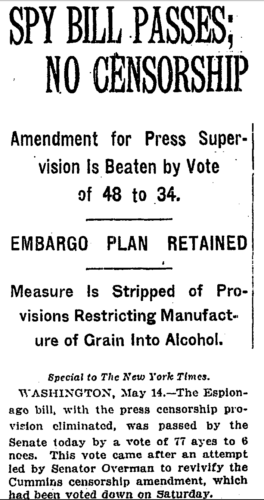 Not satisfied that censorship was excluded, Wilson pushed for an amendment to the Act that was passed by Congress (48-26 in the Senate and 293-1 in the House). The Alien and Sedition Act was enacted on May 16, 1918, just months before U.S. troops arrived on the Western Front in the First World War. Though it was called an act, it never stood alone as one, but became part of the Espionage Act.
Not satisfied that censorship was excluded, Wilson pushed for an amendment to the Act that was passed by Congress (48-26 in the Senate and 293-1 in the House). The Alien and Sedition Act was enacted on May 16, 1918, just months before U.S. troops arrived on the Western Front in the First World War. Though it was called an act, it never stood alone as one, but became part of the Espionage Act.
Wilson had the backing of influential congressmen and newspaper publishers who wanted to shut down certain speech. The Sedition Act curtailed speech especially of Americans who opposed U.S. participation in the war and particularly the draft. More than 4 million Americans fought and 110,000 died in the war. (The act may have influenced U.S. newspapers to suppress news of the 1918 flu pandemic in deference to the war effort.)
The Sedition Act’s two-paragraph amendment to the Espionage Act was specifically aimed at Americans who insulted the U.S. government, military or flag and tried to criticize the draft, military industry or sale of war bonds. It said:
“…whoever, when the United States is at war, shall willfully utter, print, write or publish any disloyal, profane, scurrilous, or abusive language about the form of government of the United States or the Constitution of the United States, or the military or naval forces of the United States, or the flag of the United States, or the uniform of the Army or Navy of the United States into contempt, scorn, contumely, or disrepute, or shall willfully utter, print, write, or publish any language intended to incite, provoke, or encourage resistance to the United States, or to promote the cause of its enemies, or shall willfully display the flag of any foreign enemy, or shall willfully by utterance, writing, printing, publication, or language spoken, urge, incite, or advocate any curtailment of production in this country of any thing or things, product or products, necessary or essential to the prosecution of the war in which the United States may be engaged, with intent by such curtailment to cripple or hinder the United States in the prosecution of war, and whoever shall willfully advocate, teach, defend, or suggest the doing of any of the acts or things in this section enumerated, and whoever shall by word or act support or favor the cause of any country with which the United States is at war or by word or act oppose the cause of the United States therein, shall be punished by a fine of not more than $10,000 or the imprisonment for not more than twenty years, or both…”
It also empowered the postmaster general to intercept and return mail to its sender stamped with the words “Mail to this address undeliverable under Espionage Act.”
This law distilled the essence of enforced loyalty of the population to the symbols and military power of the state. It demolished the idea that America is exceptional as it showed the U.S. enforcing the same state-worship as most nations in history.
Though he is not an American and the Sedition Act is no longer on the books, it is this disloyalty to the dictates of the American state that Assange is being punished for as his extradition hearing prosecutors failed to demonstrate his work caused harm. (Today’s sedition law relates to two or more people who conspire to overthrow the U.S. government.)
Espionage and Sedition Act Prosecutions
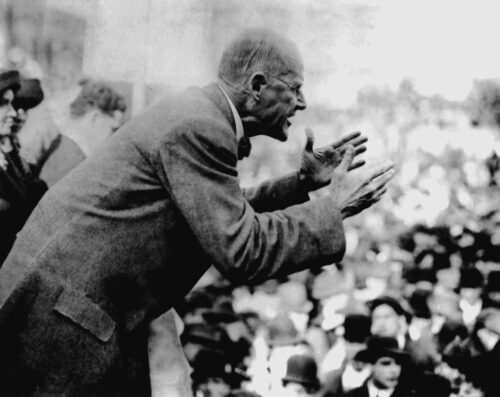
Debs at a 1918 rally, shortly before being arrested for sedition for opposing the draft. (Wikimedia Commons)
The act, with similar federal laws, was used to convict at least 877 people in 1919 and 1920, according to a report by the attorney general. In 1919, the Supreme Court heard several important free speech cases — including Debs v. United States and Abrams v. United States — involving the constitutionality of the law. In both cases, the Court upheld the convictions as well as the law.
The best-known Sedition Act prosecution was the socialist presidential candidate Eugene V. Debs. A month after the 1918 Sedition Act was passed was passed on May 16, 1918, Debs was sentenced to 10 years in prison for publicly opposing the military draft. In a June 1918 speech he had said: “If war is right let it be declared by the people. You who have your lives to lose, you certainly above all others have the right to decide the momentous issue of war or peace.”
While in jail Debs received one million votes for president in the 1920 election. Assange’s defiance of the U.S. government went well beyond Debs’ anti-war speech by uncovering war crimes and corruption.
For being seditious, Debs and Assange are the most prominent political prisoners in U.S. history.
The Schenck Case
Before the Sedition Act, Charles Schenck, the general secretary of the U.S. Socialist Party, was arrested in 1917, and convicted under the Espionage Act for mailing fliers to draft-age men opposing the First World War conscription.
He was charged with language from Section 3 of the Espionage Act that made it illegal to “make or convey false reports or false statements with intent to interfere with the operation or success of the military or naval forces of the United States” and to “cause or attempt to cause insubordination, disloyalty, mutiny, or refusal of duty in the military or naval forces … or … willfully obstruct the recruiting or enlistment service of the United States.”
Schenck’s appeal on First Amendment grounds went to the U.S. Supreme Court, which ruled in March 1919 that his conviction did not violate free speech.
It was a significant decision, rolled back somewhat in 1969 by the First Amendment case Brandenburg v. Ohio, in which the Supreme Court ruled the government could only punish inflammatory speech if it is “directed to inciting or producing imminent lawless action and is likely to incite or produce such action.” The Espionage Act indictment against Assange doesn’t allege that, other than a very weak and fraught U.S. claim Assange “intentionally” risked the lives of U.S. informants.
The ruling in Schenck’s case was a significant defeat for the First Amendment against the Espionage Act. But it did not deal with the possession and publication of classified material that Assange has been charged with. Since no journalist had ever been charged with this before, Assange’s appeal on First Amendment grounds, if it goes that far, would also be a first.
The Masses
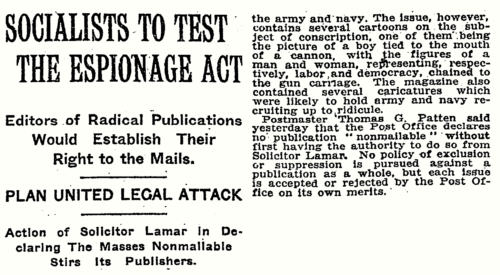 A magazine called The Masses was prosecuted in 1918 for interfering with the military draft. The magazine published some of the leading left-wing writers of the day, including Max Eastman, John Reed and Dorothy Day.
A magazine called The Masses was prosecuted in 1918 for interfering with the military draft. The magazine published some of the leading left-wing writers of the day, including Max Eastman, John Reed and Dorothy Day.
Distribution of The Masses was barred in the New York subway system, by United News Co. of Philadelphia, Magazine Distributing Co. of Boston, in university libraries, bookshops and by the Canadian postal system. Then the Associated Press sued the magazine in 1913 because it critiqued AP’s reporting of the Paint Creek-Cabin Creek strike of 1912 in West Virginia, a suit that was eventually dropped.
In 1917, The Masses was charged under the Espionage Act with “unlawfully and willfully” obstructing the recruiting and enlistment of U.S. soldiers to fight in World War I, which the magazine opposed. Louis Untermeyer, a writer for the magazine, said, “As the trial went on it was evident that the indictment was a legal subterfuge and that what was really on trial was the issue of a free press.”
The judge instructed the jury: “I do not have to remind you that every man has the right to have such economic, philosophic or religious opinions as seem to him best, whether they be socialist, anarchistic or atheistic.” The first trial ended in a mistrial when one juror was discovered to be a socialist and the other jurors demanded the prosecutors indict him too. The second trial also ended in a mistrial.
The Sedition Act was repealed by Congress in March 1921 and Debs’ sentence was commuted by President Warren Harding.
Prior Restraint in War
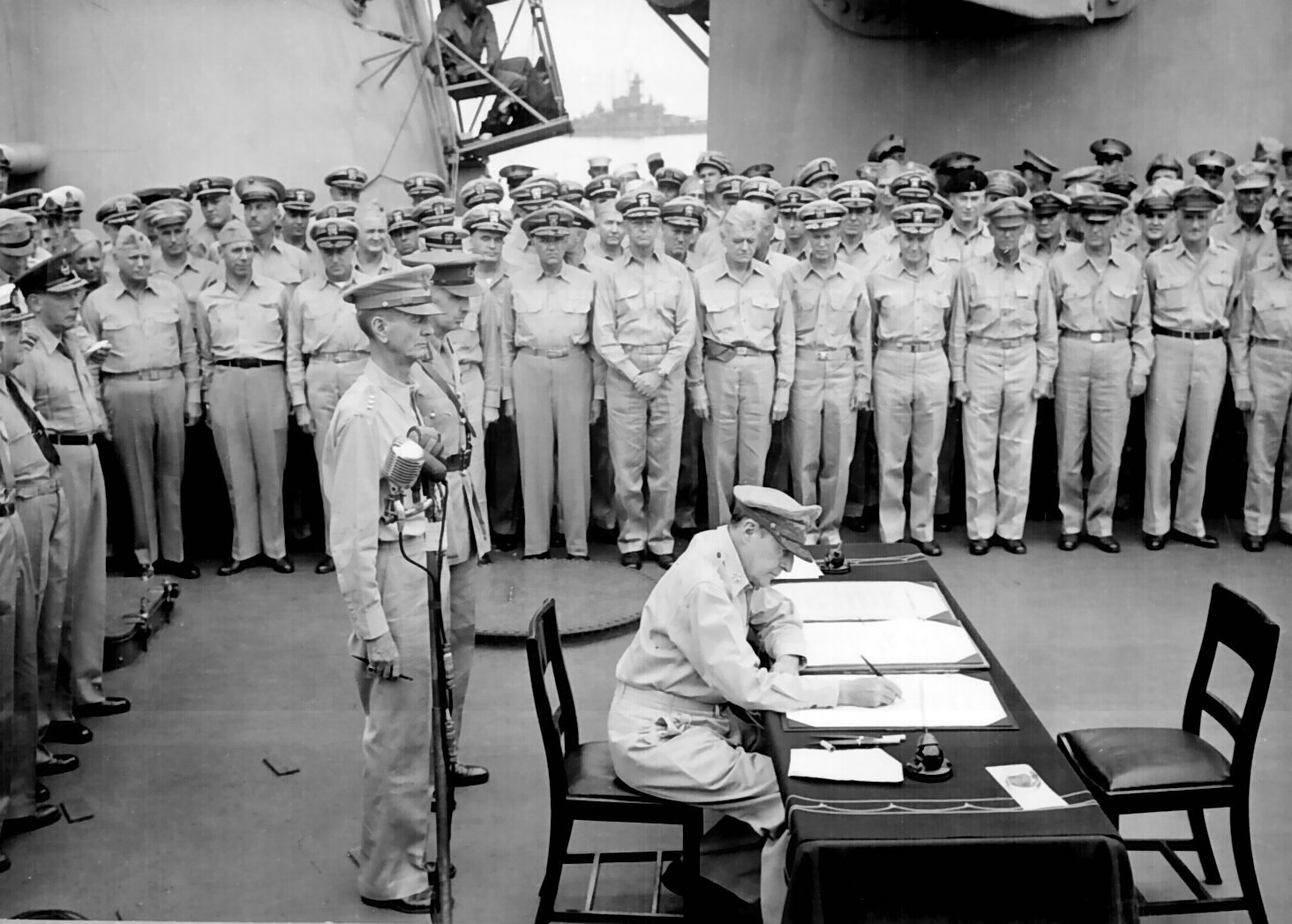
General Douglas MacArthur signs as supreme allied commander during formal surrender ceremonies on the USS MISSOURI in Tokyo Bay, Sept. 2, 1945 (US Navy)
With few exceptions, American newspapers voluntarily censored themselves in the Second World War before the government dictated it. In the Korean War, General Douglas MacArthur said he didn’t “desire to reestablish wartime censorship” and instead asked the press for self-censorship. He largely got it until the papers began reporting American battlefield losses.
On July 25, 1950, “the army ordered that reporters were not allowed to publish ‘unwarranted’ criticism of command decisions, and that the army would be ‘the sole judge and jury’ on what ‘unwarranted’ criticism entailed,” according to a Yale University study on military censorship.
After excellent on-the-ground reporting from Vietnam brought the war home to America and spurred popular anti-war protests, the military reacted by blaming the news media for its defeat. It then instituted, initially in the First Gulf War, serious control of the press by “embedding” reporters from private media companies, which accepted the arrangement, much as World War II newspapers censored themselves.
FDR Targets Newspaper
When The Chicago Tribune defied World War II censorship in 1942 by reporting that the U.S. Navy knew Japan’s strategy for the Battle of Midway — evidently by decoding Japanese communications — President Franklin D. Roosevelt attempted to use the Espionage Act to prosecute a reporter for the first time for publishing defense information. His Justice Department had a grand jury empaneled in Chicago, which, unlike in the Assange case, refused to return an indictment.
Three years later the FBI raided the offices of Amerasia, a pro-communist publication, which had obtained classified information, including up to “Top Secret,” and published articles based on it. It seemed a clear, technical violation of the Espionage Act for possessing and communicating state secrets, but a grand jury again refused to indict under the Act because the publication did not pass secrets to a foreign power, as Assange has not. 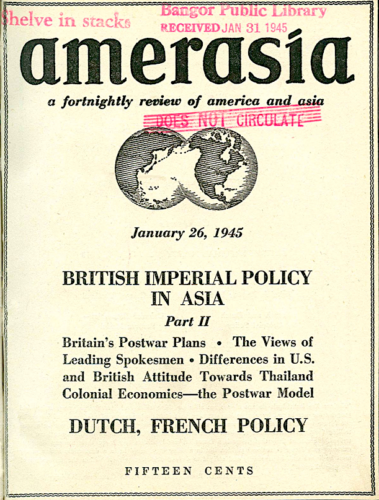
Right-wingers in Congress were incensed and, helping to launch the McCarthyist era, mobilized to pass in 1950 amendments to the Espionage Act, including section 798 and sub-sections 793(e) and (g), which has directly affected Assange.
While the U.S. prosecution in his extradition case at first argued that he was not a journalist and its case was not about journalism, it later changed tack — after defense witnesses strongly indicated that it was — and argued instead that Assange had violated sub-section 793(e) for possession and publication of defense information.
In a sense it can be said that Assange is at least an indirect victim of McCarthyism.
McCarran Internal Security Act
The McCarthyist scare was just underway in 1950 when an amendment to the Espionage Act added Section 793 (e) and (g) and Section 798. The Act that contained the amendments was named after its sponsor, Democratic Sen. Pat McCarran of Nevada.
While the act was being debated in 1949, West Virginia Sen. Harley Kilgore wrote to McCarran, warning that the amendment “might make practically every newspaper in the United States and all the publishers, editors, and reporters into criminals without their doing any wrongful act.”
The U.S. attorney general wrote at the time, falsely it turned out, “that nobody other than a spy, saboteur, or other person who would weaken the internal security of the Nation need have any fear of prosecution under either existing law or the provisions of this bill.”
The language in the British and U.S. espionage laws that have been considered is exceedingly broad, giving governments on both sides of the Atlantic wide berth to bring prosecutions on anyone. The 1950 amendments to the Espionage Act made that language broader still.
The most significant 1950 change to the Espionage Act was to remove intent and make mere retention of defense information illegal. According to Harold Edgar and Ben Schmidt Jr. in the May 1973 edition of Columbia Law Review:
“The basic provisions of sections 793 and 794 have been changed importantly only once since 1917. As a little-noted aspect of the massive Internal Security Act of 1950, section 793 was extended by the addition of subsection (e). This provision departed from the established pattern of the 1917 Act by imposing a prohibition applicable to everyone, not conditioned on any special intent requirement, on communication of information relating to the national defense to persons not entitled to receive it. Mere retention of defense information was also made a crime.”
Subsection (e) removed the requirement that anyone who had unauthorized possession of state secrets return it to proper authorities on their “demand.” It now has to be returned without any such demands. So a journalist like Assange who received defense information without authority, did not immediately return it, and communicated it could more easily be prosecuted with the government not having to prove any intent on his part.
Edgar and Schmidt add:
“The sweep of these provisions seems incredible when measured against the congressional antipathy, manifested both in the 1917 debates and in subsequent confrontations with the problem of secrecy, to broad prohibitions that would hinder public speech on defense matters. No special culpability requirement explicitly restricts their reach. Barring the possible effect of limiting constructions, any ‘communicating’ of defense material or information to anyone not authorized to hear about it is a serious criminal offense. Even retaining possession of such material is unlawful for those who lack special authorization.
If these statutes mean what they seem to say and are constitutional, public speech in this country since World War II has been rife with criminality. The source who leaks defense information to the press commits an offense; the reporter who holds onto defense material commits an offense; and the retired official who uses defense material in his memoirs commits an offense.”
The McCarran Act’s adoption of 793 (g) added conspiracy to the Espionage Act. It says:
“If two or more persons conspire to violate any of the foregoing provisions of this section, and one or more of such persons do any act to effect the object of the conspiracy, each of the parties to such conspiracy shall be subject to the punishment provided for the offense which is the object of such conspiracy.”
Assange was also charged under this section for allegedly conspiring with his source, Chelsea Manning, in what is otherwise seen as a routine relationship between a reporter and a source.
The Internal Security Act also went as far as creating a Subversive Activities Control Board to investigate someone merely suspected of engaging in subversive activities. It created an emergency detention statute giving the president authority to arrest “each person as to whom there is a reasonable ground to believe that such person probably will engage in, or probably will conspire with others to engage in, acts of espionage or sabotage.” (The Board was defunded in 1974.)
President Harry Truman vetoed the McCarran Act. Without addressing the changes to the Espionage Act, Truman said McCarran threatened “the greatest danger to freedom of speech, press, and assembly since the Alien and Sedition Laws of 1798;” made a “mockery of the Bill of Rights” and was a “long step toward totalitarianism.”
But a McCarthyist Congress overrode Truman’s veto. Had it not, it may have been harder to indict Assange.
The Act’s Territorial Reach — The Amendment That Imperils Assange
If the original 1917 Espionage Act were still in force, the U.S. government could not have charged Assange under it because the 1917 language restricted the territory where it could be applied:
“The provisions of this title shall extend to all Territories, possessions, and places subject to the jurisdiction of the United States whether or not contiguous thereto, and offenses under this title when committed upon the high seas or elsewhere within the admiralty and maritime jurisdiction of the United States …”
WikiLeaks publishing operations have never occurred in any of these places. But in 1961 Virginia Congressman Richard Poff, after several tries, was able to get the Senate t0 repeal Section 791 that restricted the Act to “within the jurisdiction of the United States, on the high seas, and within the United States.”
Poff was motivated by the case of Irvin Chambers Scarbeck, a State Department official who was convicted of passing classified information to the Polish government during the first Cold War.
Polish security agents had burst into a bedroom to photograph Scarbeck in bed with a woman who was not his wife. Showing him the photos, the Polish agents blackmailed Scarbeck: turn over classified documents from the U.S. embassy or the photos would be published and his life ruined. Adultery was seen differently in that era.
Scarbeck then removed the documents from the embassy, which is U.S. territory covered by the Espionage Act, and turned them over to the agents on Polish territory, which at the time was not.
Scarbeck was found out and fired, but could not be prosecuted because of the territorial limitations of the Act. That set Poff off on a one-man campaign to extend the reach of the Espionage Act to the entire globe.
The Espionage Act thus became global, ensnaring anyone anywhere in the world into the web of U.S. jurisdiction.
“Justice Hugo Black: ‘The press was to serve the governed, not the governors. The Government’s power to censor the press was abolished so that the press would remain forever free to censure the Government.'”
Pentagon Papers Case
The 1971 decision of the Supreme Court against the Nixon administration’s “prior restraint” injunction of The New York Times, allowing the press to continue publishing the Pentagon Papers, is well known.
Less known is that the Nixon Justice Department empaneled a grand jury in Boston with the intention of indicting reporters from the Times, The Washington Post and The Boston Globe under the Espionage Act for publishing articles based on the classified Papers.
It was the second attempt, after FDR, by an administration to charge reporters with espionage for possessing and publishing state secrets.
Nixon was able to set up the grand jury because the Supreme Court made clear in the Times case that though the government could not stop a newspaper from publishing classified matter in advance, it could pursue prosecutions after publication for violating the Espionage Act.
This is highly relevant to the Assange case as his prosecutor, James Lewis QC, brought it up during the September extradition hearing in London. At first Lewis stressed to the court the U.S. view that Assange was not a journalist. After a succession of defense experts dismantled that view, Lewis essentially conceded that Assange was a journalist, but that the Espionage Act gave the government the authority to prosecute journalists after publishing defense information.
Justice Byron White in the Papers case said newspapers were “not immune from criminal action” for publishing classified information. “Failure by the Gov. to justify prior restraints does not measure its constitutional entitlement to a conviction for criminal publication. That the Gov. mistakenly chose to proceed by injunction does not mean that it could not successfully proceed in another way.”
The question of prior restraint versus no restraint after publication was debated at the founding of the United States. James Madison believed it a “mockery to say that no law should be passed preventing publications from being made, but that laws might be passed for punishing them in case they should be made.” Had Madison’s view prevailed, the Espionage Act could not have been used against a journalist like Assange post publication.
But instead the Espionage Act adopted the logic of Adam’s pernicious 1798 Sedition Act, which was based on a 1769 commentary by William Blackstone, an English jurist, judge and Tory politician, who wrote, “liberty of the press … consists in laying no previous restraints upon publications and not in freedom from censure for criminal matter when published.”
In the Papers’ case, the Boston grand jury was disbanded only after prosecutorial misconduct in the trial of the Times’ source, Daniel Ellsberg, led to his case being dismissed.
Ellsberg was the first newspaper source to be prosecuted under the Espionage Act. When the Times’ reporters under grand jury scrutiny, Neil Sheehan and Hedrick Smith, learned that Ellsberg’s phone had been tapped, they asked the government whether they had been tapped as well in their conversations with their source. Shortly after that, their case was dropped, Ellsberg told me in an interview.
The Nixon Justice Department was in a position to bring Espionage Act charges against then U.S. Sen. Mike Gravel of Alaska. After being turned down by several senators, including Sen. George McGovern who was planning a run for president, Ellsberg found Gravel willing to read the Papers out loud into the congressional record during a Senate subcommittee meeting.
On June 29, 1971, the night before the Supreme Court decision, Gravel legally revealed the classified Pentagon Papers on Capitol Hill because of the U.S. Constitution’s Speech or Debate clause, which says that, “for any Speech or Debate in either House,” members of Congress “shall not be questioned in any other Place.” That means any senator or representative can in effect declassify any material without penalty if done during a legislative act.
But when Gravel arranged with Beacon Press in Boston to publish the Papers as a five-volume book, he lost this legal protection. Gravel told me for the book we co-authored, A Political Odyssey, that he did this because after the Supreme Court judgement the newspapers nonetheless stopped writing stories based on the Papers.
Gravel feared Nixon would indict him. While the government could not stop Beacon from publishing, it could prosecute afterward. Nixon left Gravel alone, however, and instead went after the publisher, the way Trump went after Assange.
Gobin Stair, executive director of Beacon Press, told a conference in Boston in October 2002 that he decided to publish the Papers after Nixon picked up the phone to threaten him:
“I recognized his voice, and he said, ‘Gobin, we have been investigating you around Boston. I hear you are going to do that set of papers by that guy Gravel.’ It was obvious he was going to ask me not to publish it. The result was that as the guy in charge at Beacon, I was in real trouble. To be told by Nixon not to [publish this book], convinced me that it was a book to do.”
On Sept. 17, 1971, two Pentagon goons replete with fedoras, trench coats, and cigarettes showed up at Beacon’s offices on the hill overlooking Boston Common. They tried to intimidate Stair. They demanded the Papers for military analysts to study. They checked the photocopy machine to see if Ellsberg had used it. But the tough-guy act failed. Stair stalled by agreeing to a follow-up meeting. Then the Pentagon suddenly dropped the matter.
Twelve days before Beacon Press’ publication date the Pentagon published its own paperback edition of the Pentagon Papers. So much for harming national security. It was Nixonian vindictiveness to take the wind out of Beacon’s sails and sales. What he considered stolen property he put on sale at $50 for a 12-volume set.
Secrecy and the Press’ Role
Supreme Court justices in the Pentagon Papers case underscored the role the press plays to reign in authoritarian leaders who over-classify information to protect their interests in the name of “national security.”
In retrospect, the justices’ opinions amount to a defense from the highest levels of U.S. government of the work of Assange and WikiLeaks.
Justice Hugo Black challenged the “national security” mantra as a subterfuge to justify secrecy and repression. In his Pentagon Papers opinion, he wrote:
“The word ‘security’ is a broad, vague generality whose contours should not be invoked to abrogate the fundamental law embodied in the First Amendment. The guarding of military and diplomatic secrets at the expense of informed representative government provides no real security for our Republic.”
He went on:
“In the First Amendment the Founding Fathers gave the free press the protection it must have to fulfill its essential role in our democracy. The press was to serve the governed, not the governors. The Government’s power to censor the press was abolished so that the press would remain forever free to censure the Government.
The press was protected so that it could bare the secrets of government and inform the people. Only a free and unrestrained press can effectively expose deception in government. And paramount among the responsibilities of a free press is the duty to prevent any part of the Government from deceiving the people and sending them off to distant lands to die of foreign fevers and foreign shot and shell.
In my view, far from deserving condemnation for their courageous reporting, The New York Times, The Washington Post and other newspapers should be commended for serving the purpose that the Founding Fathers saw so clearly. In revealing the workings of government that led to the Vietnam war, the newspapers nobly did precisely that which the founders hoped and trusted they would do.” [Emphasis added.]
Justice Potter Stewart wrote in his Pentagon Papers opinion that:
“In the absence of the governmental checks and balances present in other areas of our national life, the only effective restraint upon executive policy and power in the areas of national defense and international affairs may lie in an enlightened citizenry— in an informed and critical public opinion which alone can here protect the values of democratic government. For this reason, it is perhaps here that a press that is alert, aware, and free most vitally serves the basic purpose of the First Amendment. For without an informed and free press there cannot be an enlightened people.”
Justice William Douglas went even further, questioning whether the Espionage Act related to the press at all, and whether journalists and publishers can be prosecuted after publication, as Assange has been. Douglas wrote:
“There is … no statute barring the publication by the press of the material which The Times and Post seek to use. 18 U.S.C. Section 793 (e) provides that ‘whoever having unauthorized possession of, access to, or control over any document, writing, … or information relating to the national defense which information the possessor has reason to believe could be used to the injury of the United States or to the advantage of any foreign nation, wilfully communicates … the same to any person not entitled to receive it … shall be fined not more than $10, 000 or imprisoned not more than 10 years or both.”
The Government suggests that the word, ‘communicates’ is broad enough to encompass publication.
There are eight sections in the chapter on espionage and censorship, Sections 792-799. In three of those eight, ‘publish’ is specifically mentioned: Section 794 (b) provides, ‘Whoever in time of war, with the intent that the same shall be communicated to the enemy, collects records, publishes, or communicates … [the disposition of armed forces].’
Section 797 prohibits ‘reproduces, publishes, sells, or gives away’ photos of defense installations.
Prior Restraint in Britain
The Pentagon Papers case revealed one difference between U.S. and British law in regard to prior restraint. While the Supreme Court would not allow publication of the Papers to be enjoined, the absence of a First Amendment in Britain has freed the government to halt publication on occasion. A most celebrated case was that of the book Spycatcher, a memoir by Peter Wright, a former assistant director of MI5. The British government got an injunction in 1985 to ban its release.
The Margaret Thatcher government then went to court in Australia to ban the book there, but lost the case, defended by future Prime Minister Malcolm Turnbull. The book was released in Australia and in the U.S. on July 31, 1987.
English newspapers tried to publish excerpts but were served gag orders and later were charged with contempt of court. The ban on English papers was then partially lifted by three High Court judges a week before U.S. and Australian publication, but three weeks later senior Law Lords reinstated the ban on appeal.
Lord Ackner for the 3-2 majority said if the ban were not reimposed, the Attorney General would be “prematurely and permanently” denied court protection. He said:
“It would be established, without trial and for all time, that by the simple expedient of going abroad, and arranging publication in the press in a country such as the United States — where there is no remedy by way of injunction — the courts in this country would become incapable of exercising their well-established jurisdiction. Your Lordships would have established a charter for traitors to publish on the most massive scale in England whatever they had managed to publish abroad. …
If the publication of this book in America is to have, for all practical purposes, the effect of nullifying the jurisdiction of the English courts to enforce compliance with the duty of confidence, . . . then, . . . the English law would have surrendered to the American Constitution. There the courts, by virtue of the First Amendment, are, I understand, powerless to control the press. Fortunately, the press in this country is, as yet, not above the law.”
Labour MP Tony Benn defied the ban by reading aloud from the book in Hyde Park’s Speakers Corner. British newspapers reacted with disdain. The Daily Mail pictured the three Law Lords upside down on its front cover with the headline: “YOU FOOLS.” The Economist ran a blank page with the explanation that in only one country were excerpts banned. “For our 420,000 readers there, this page is blank — and the law is an ass.”
In October 1988 the Law Lords reversed themselves, allowing publication because, as the BBC reported, “any damage to national security has already been done by its publication abroad.”
The British government’s actions were not based on statutory authorization for prior restraint but rather on common law. Because there is no formal censorship clause in the Official Secrets Act of a kind that President Wilson had sought, instances of British prior restraint cannot be laid on the Act, but rather on no First Amendment-type legislation and Britain’s lack of adherence to Article 10 of the 1950 European Convention on Human Rights, which guarantees free speech.
The 1989 Official Secrets Act
The most significant change in the Official Secrets Act of 1989 is that it largely brought it into line with the McCarran-amended Espionage Act: intent was removed, thereby eliminating the public interest defense. A 1988 government White Paper considering changes to the OSA, stated:
“Suggestions have been made that the law should provide a general defence that disclosure was in the public interest. The object would be to enable the courts to consider the benefit of the unauthorised disclosure of particular information, and the motives of the person disclosing it, as well as the harm which it was likely to cause. It is suggested, in particular, that such a defence is necessary in order to enable suggestions of misconduct or malpractice to be properly investigated or brought to public attention.
The Government recognises that some people who make unauthorised disclosures do so for what they themselves see as altruistic reasons and without desire for personal gain. But that is equally true of some people who commit other criminal offences. The general principle which the law follows is that the criminality of what people do ought not to depend on their ultimate motives – though these may be a factor to be taken into account in sentencing – but on the nature and degree of the harm which their acts may cause. …
It cannot be acceptable that a person can lawfully disclose information which he knows may, for example, lead to loss of life simply because he conceives that he has a general reason of a public character for doing so. So far as the criminal law relating to the protection of official information is concerned, therefore, the Government is of the mind that there should be no general public interest defence and that any argument as to the effect of disclosure on the public interest should take place within the context of the proposed damage tests where applicable.”
In other words, strict liability would be imposed: either one broke the law, or one didn’t, no matter the reason.
The changes were spurred by the fallout from a case involving the 1982 British sinking of the Argentine warship General Belgrano during the Falklands/Malvinas war, which killed 360 people. Clive Ponting, a senior civil servant at the Ministry of Defence at the time, leaked a document to a Labour MP exposing the government lie that it had acted in self-defense.
In fact the document showed the Belgrano was sailing out of a British-declared, 200-mile exclusion zone around the Falklands. Ponting was put on trial in 1985 for violating the Official Secrets Act and mounted a public interest defense.
Though the judge indicated to the jury that it should find Ponting guilty, infamously saying “The ‘public interest’ is what the government of the day says it is,” the jury acquitted Ponting on the grounds that what he had done was indeed in the public interest.
It was a great embarrassment for Prime Minister Margaret Thatcher, who had staked her re-election on the war. So her government set about amending the Act to remove the public interest defense altogether. It also explicitly made it a crime for anyone, including a journalist, to commit the offenses of possession and disseminating classified information.
The implications for Assange of these changes are stark. In her judgement in Assange’s extradition hearing, Baraitser upheld the Espionage Act charges against him because she said they met the criteria of his alleged activities being a crime in both the U.S. and Britain — a requirement in an extradition case. Before the 1989 removal of the public interest defense, which does not exist in the Espionage Act, that would have less likely been the case.
Being unable to explain that the intent of one’s actions was in the public interest is fatal to a case like Assange’s. Ellsberg has many times told the story that when he was on the witness stand in his Espionage Act case the judge prevented him from explaining why he had leaked the Pentagon Papers.
The 1989 Act repealed Section 2 of the 1911 act, which criminalized the mere character of a defendant and took the burden of proof from the prosecution. It also added a Section 5 that explicitly makes members of the public, which would include journalists, liable to prosecution.
According to a House of Commons study “if a member of the public (or any person who is not a Crown Servant or government contractor) has in their possession official information in any of the six categories, and this information has:
• been disclosed to them by a Crown Servant without lawful authority; or
• was entrusted to them by a Crown Servant in confidence, then it is an offence to disclose this information without lawful authority.”
Among the six categories of unauthorized disclosure include “• Security and intelligence • Defence • International Relations • Information which might lead to the commission of crime and • Foreign confidences.” This clearly jeopardizes any reporter who is given “official information” by a whistleblowing source.
There may be worse to come. Proposed changes to the 1989 Act by the Boris Johnson government, which would give intelligence agencies “the tools they need to disrupt hostile state activity,” have alarmed journalists even further. A National Union of Journalists spokesman, referring to the proposals by the Law Commission in 2017 to make gathering secret information a crime, told The Guardian: “The union expressed opposition at the time because the proposals included making it easier to prosecute journalists and increased the likelihood of conviction.”
Obama’s ‘NYT Problem’
After the Pentagon Papers case, the Gerald Ford and Ronald Reagan administrations threatened, but did not follow through, with Espionage Act indictments against the press. The Ford administration in 1975 discussed indicting journalist Seymour Hersh after he reported in The New York Times that U.S. submarines were spying on Soviet communications. In 1981 the Reagan Justice Department threatened but backed down on indicting author James Bamford for his groundbreaking book on the National Security Agency, The Puzzle Palace.
A reason the Espionage Act was not used against journalists until Assange, even though it could have been, is because of the Act’s inherent contradiction with the First Amendment. The Barack Obama administration aggressively used the Act against press sources, indicting more than any administration before.
When WikiLeaks published the Iraq and Afghanistan war diaries and the State Department cables in 2010, an incensed Obama Justice Department empaneled a grand jury with the intention of indicting Assange under the Espionage Act.
Then Vice President Joe Biden said if Assange conspired to get the classified material then his case was closer to the actions of a “high-tech terrorist” than to the Pentagon Papers.
Though prosecutors tried to construct a case that Assange was complicit with his source Chelsea Manning in illegally obtaining defense material, they ultimately concluded that Assange was working as a journalist and his prosecution was complicated by the First Amendment.
As The Washington Post put it in 2013 when it explained the Obama DOJ’s decision not to prosecute Assange:
“Justice officials said they looked hard at Assange but realized that they have what they described as a ‘New York Times problem.’ If the Justice Department indicted Assange, it would also have to prosecute the New York Times and other news organizations and writers who published classified material, including The Washington Post and Britain’s Guardian newspaper.”
In fact, the documents that Assange has been indicted for releasing on Afghanistan, Iraq and Guantanamo were the exact ones reported on by The New York Times, The Guardian and WikiLeaks’ other media partners, but only Assange has been prosecuted.
The Political and Class Nature of These Acts
While the overt intentions of legislators in Britain and the U.S. in enacting these laws may have been to combat foreign espionage, the broadness and complexity of the language left open its use, intentionally or not, against the press and the interests of the public. Instead, these Acts protect the interests of a class of people who have accrued vast power and are responding to the crisis of their rule with increasing aggression against anyone who threatens it.
Two U.S. presidents came close to prosecuting journalists and a third has indicted Assange for publishing defense information. Wilson intended the Espionage Act to censor the press. Though Congress defeated that effort it left an Act that has been used after publication to punish the press on the grounds of “national security” defined by the government of the day.
The British legal scholar David Glyndwr Tudor Williams warned back in 1965:
“It is surely desirable that the operation of the Official Secrets Acts should be severely confined. They should not be wielded as an all-purpose weapon, whatever the literal wording of their provisions. They should not be invoked unnecessarily – where other appropriate laws are available – or for trivial considerations. Their only admissible purpose in a democracy should be to restrain and punish espionage, gross breaches of trust and gross carelessness in respect of State secrets. They should not be used to intimidate the Press and to encourage a timidity in the handling of official information which in the end deprives an administration of the scrutiny and criticism necessary for efficiency and responsibility. If they are used too readily to stifle exposures of governmental inefficiency and corruption they could become as oppressive as the law of sedition once was.”
But indeed that is how they have now been used. And for a political purpose: to protect the interest of people in power.
In a 1990 academic paper, Australian scholar Barbara Hocking quoted journalist Tony Bunyan in his 1977 book The Political Police in Britain:
“In an analysis of the political uses of the criminal law in the United Kingdom, Bunyan turns this theoretical myth around: the fundamental purpose of the criminal law is the maintenance of a political order acceptable to the British ruling class; this was the primary purpose of the secrets legislation: ‘The British state has available to it the whole of criminal law for use against political opposition: the laws used against political activists embrace those normally used against the criminal and those for maintaining public order.'”
A Shattered Notion
Both British and U.S. espionage legislation throughout their histories have been as much political as legal instruments, allowing punishment not only for foreign spies, but for government officials who leak embarrassing information and for journalists who publish it.
Until now a difference between the Espionage and Official Secrets Acts has been the First Amendment. Without one, Britain has been more easily able to prosecute journalists. That led to the notion that the U.S. is better off because it does not have an “Official Secrets Act.” But the indictment of the journalist Assange, despite the First Amendment, has shattered that notion, giving the U.S. in effect an Official Secrets Act of its own.
At the time of the Pentagon Papers case, former U.S. Secretary of State Dean Acheson called for a “severe official secrets act” to go after journalists, not acknowledging that the U.S. already had one in the Espionage Act, which has now been proven with the indictment of Assange.
The political and class nature of these British and U.S. laws that go beyond classic foreign espionage to endanger journalists has never been clearer than in the Assange case, a man clearly seen as a class enemy for exposing rulers’ crimes and corruption.
Assange in the Dock

Joseph Farrell, (second from left), Kristinn Hrafnsson, Craig Murray and Stella Moris during break outside Old Bailey, Sept. 24, 2020. (Mohamed Elmaazi)
After three previous presidents came close to prosecuting journalists for possessing and publishing defense information — FDR in 1942, Nixon in 1971 and Obama in 2011 — the Trump administration unveiled an Espionage Act indictment shortly after Assange’s arrest in April 2019. Trump’s secretary of state tried to justify it by saying the U.S. had universal jurisdiction to prosecute but the First Amendment wouldn’t apply to Assange.
On the first day of Assange’s extradition hearing, prosecutor James Lewis QC directly addressed the press box. He said the prosecution was not about the press, because Assange was not a journalist. This was a tacit acknowledgement that the Espionage Act charges are in conflict with the First Amendment.
After numerous defense witnesses testified that Assange had engaged in journalistic activity (as the Espionage Act indictment against him itself describes), the U.S. changed its approach.
The prosecution essentially admitted that Assange was indeed acting as a journalist, but that 793 (e) of the Espionage Act made no exceptions for journalists: Assange had unauthorized possession of defense information and had disseminated it to unauthorized persons. (There is a bill in Congress that would amend the Espionage Act to make such an exception for the press.)
Assange’s judge, Vanessa Baraitser, ultimately denied the U.S. extradition request on Jan. 4, on health grounds. But her 134-page judgement agreed with the U.S. on every other point that criminalizes journalism.
If the U.S. wins the appeal it filed on Feb. 13 in the London High Court it can try Assange in the U.S. on the Espionage Act charges that went unchallenged by Baraitser.
Baraitser’s decision underscored the close alignment of the Espionage and Official Secrets Acts. Since in an extradition case an act must be a crime in both countries, what Assange is accused of must be prohibited under both Acts. In her judgement, Baraitser pointed out how Assange would be just as liable under the Official Secrets Act:
“Section 5 of the OSA 1989 imposes criminal liability on a third party who comes into possession of information which has been disclosed to them by a Crown servant without lawful authority and who further discloses it in the circumstances prescribed by section 5. It applies to any individual, including a journalist, who is not a Crown servant, a contractor or a notified person, and it applies when protected information is published which caused damage to the work of the security and intelligence services.”
The damage Assange has done to these services is to their reputations, which is why they have come down so hard on him. The government has been unable to prove harm to any U.S. informants or service members as a result of any WikiLeaks publication. This became clear during Assange’s extradition hearing.
Assange’s treatment is not unusual, seen in the context of the long U.S. history of repression of a free press despite the First Amendment. Part of that repression has been the 1917 Espionage Act and its amendments, which helped set the stage for the Trump administration to trigger the first indictment of a journalist on an espionage charge.
Should Assange be extradited and face those charges in U.S. federal court it would fulfill the lust of reactionaries from the founding of the country to punish journalists for uncovering their secret crimes and corruption.
Joe Lauria is editor-in-chief of Consortium News and a former UN correspondent for The Wall Street Journal, Boston Globe, and numerous other newspapers. He was an investigative reporter for the Sunday Times of London and began his professional career as a stringer for The New York Times. He can be reached at joelauria@consortiumnews.com and followed on Twitter @unjoe
This is Part 2 of a two part series. You can read Part 1 here: “ASSANGE EXTRADITION: Espionage is the Charge, But He’s Really Accused of Sedition.”


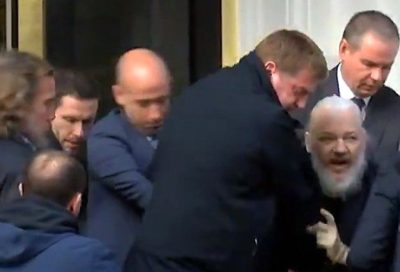
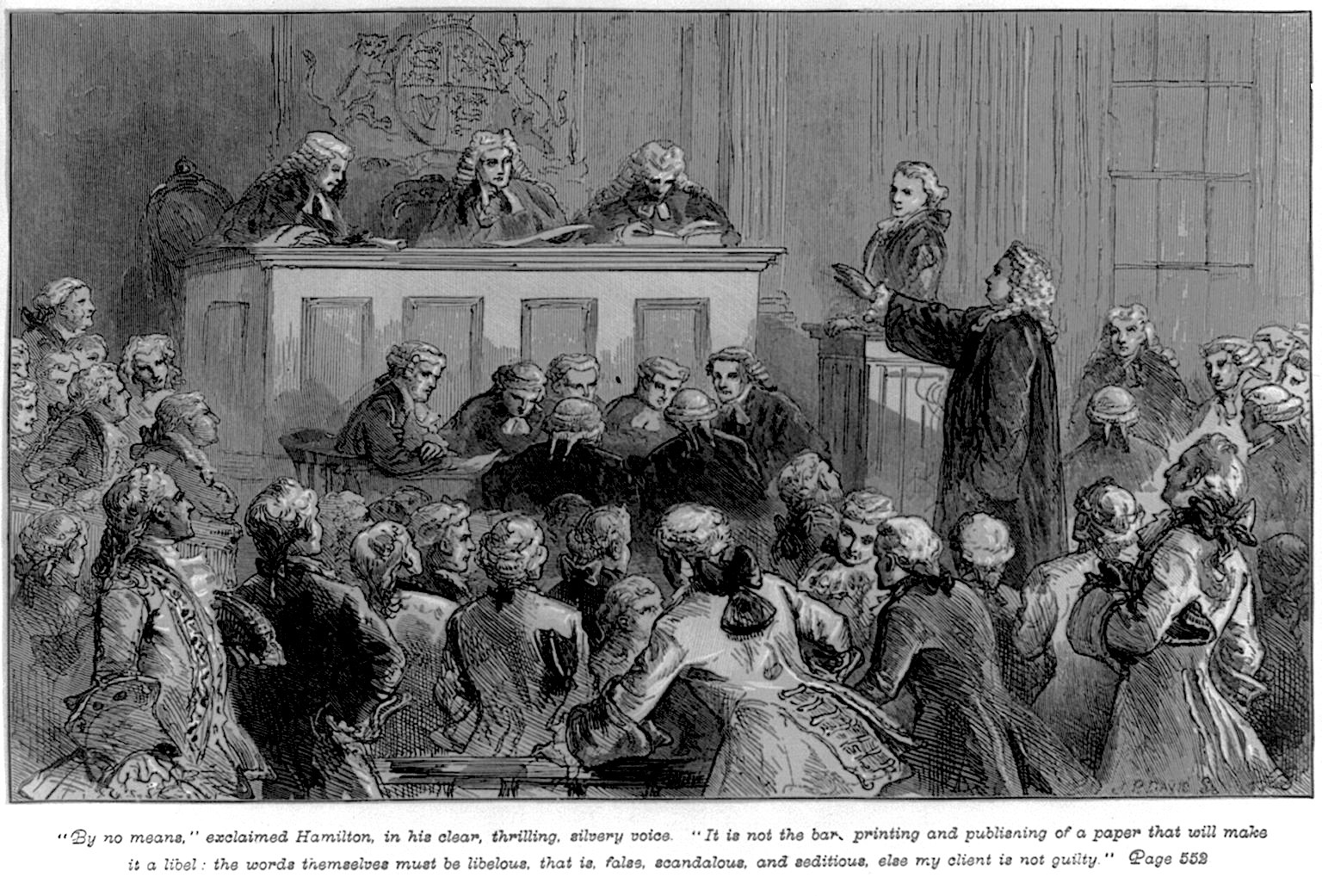
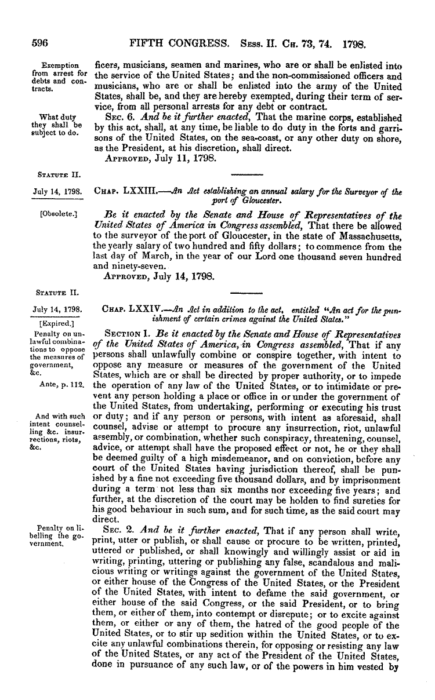
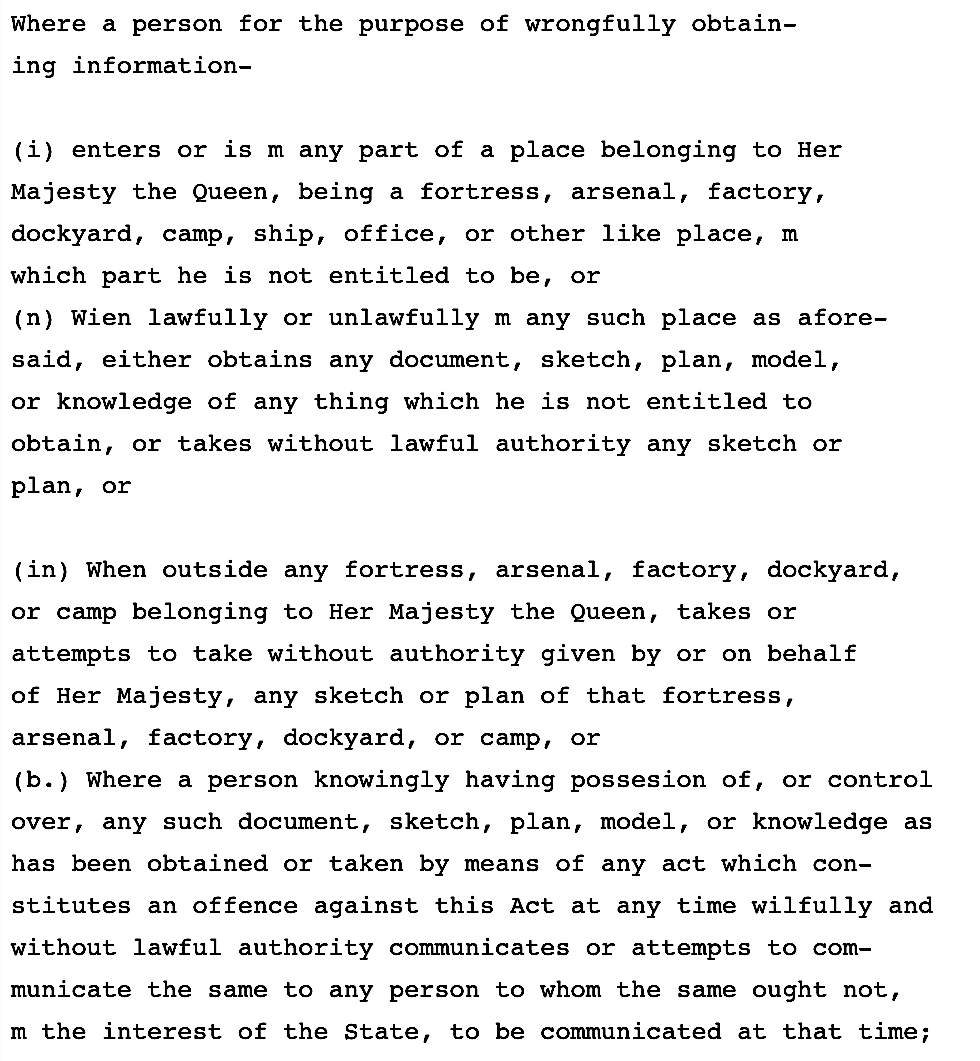
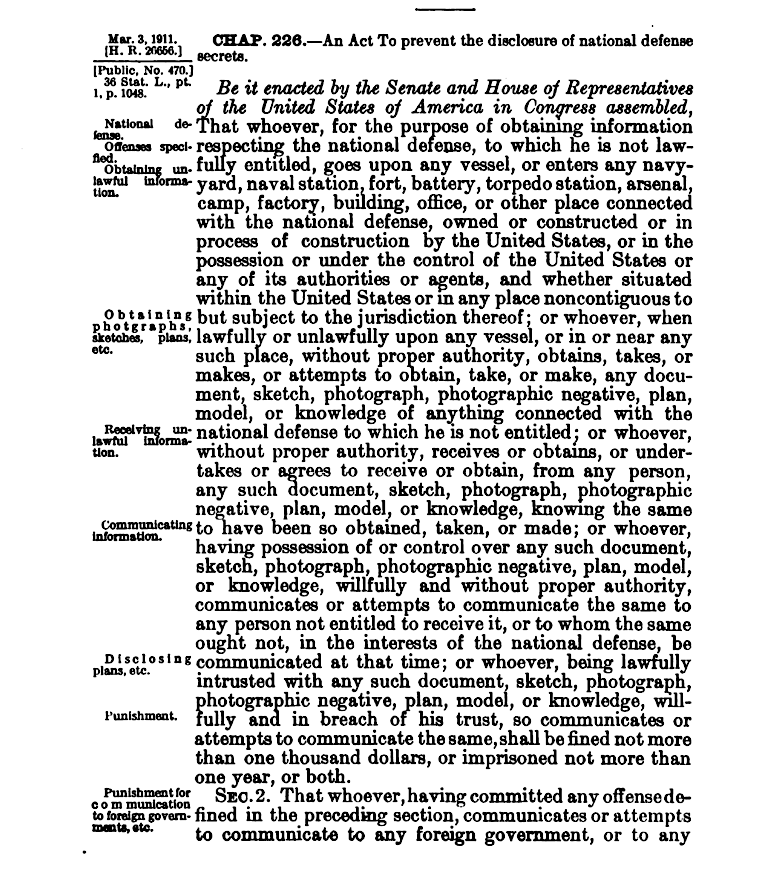
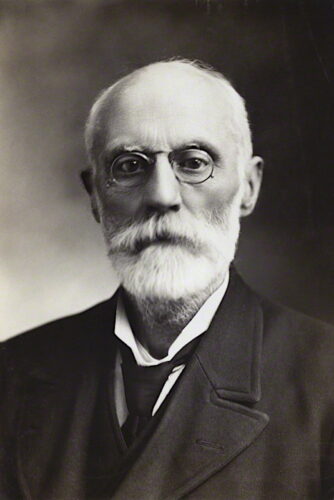
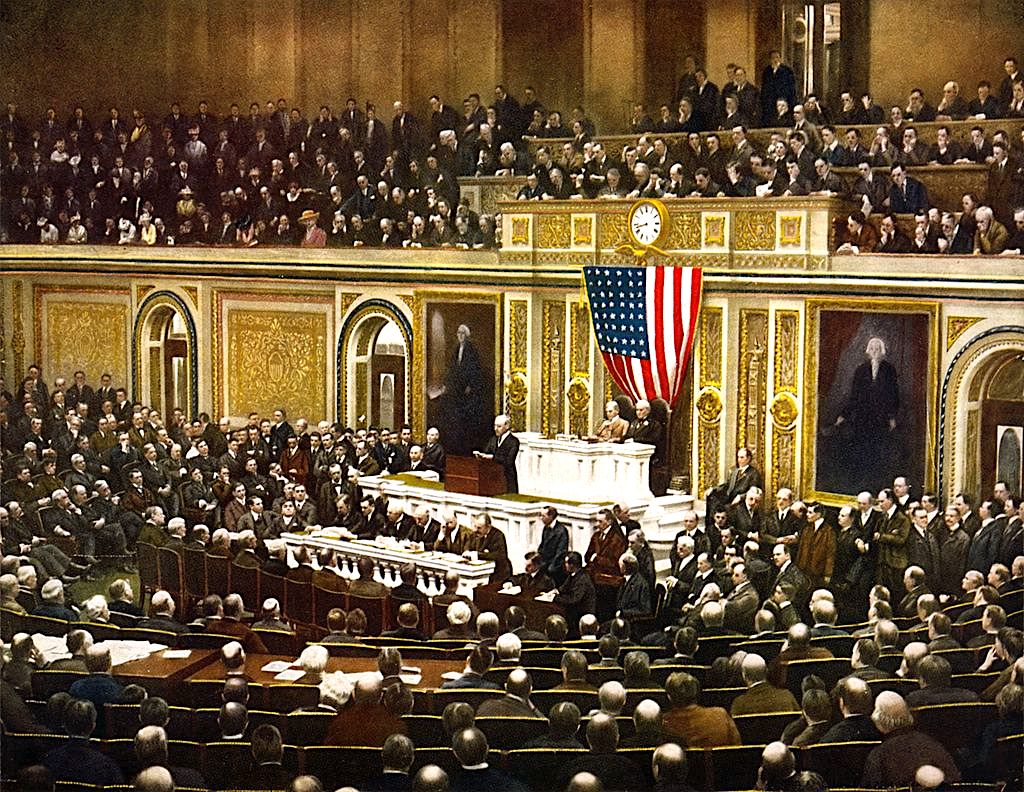
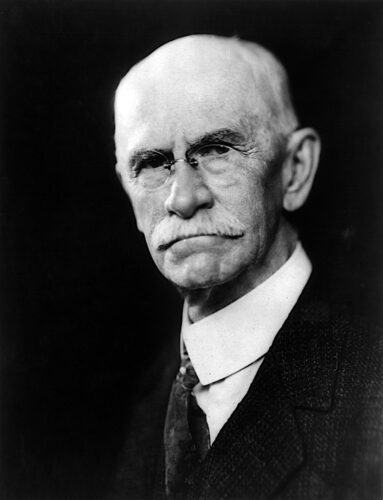
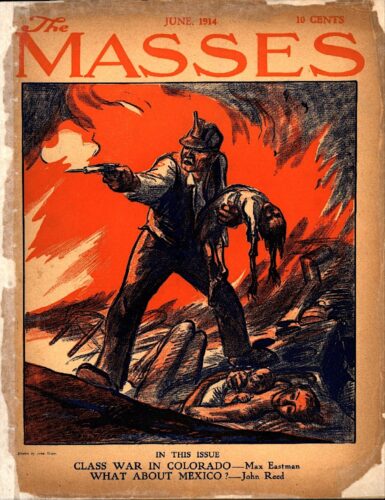

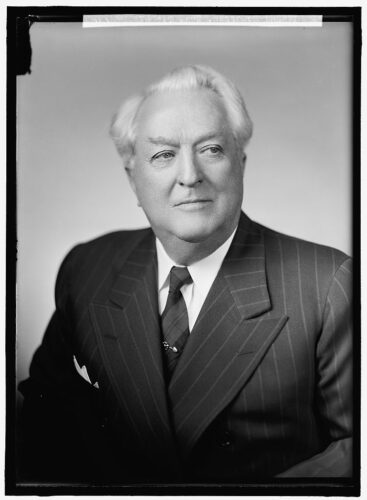
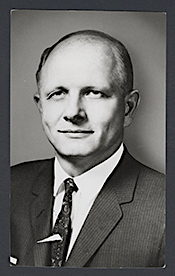

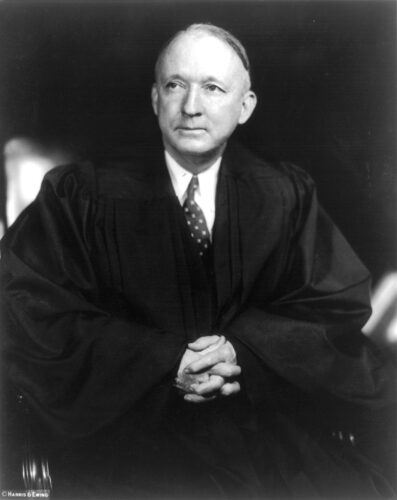

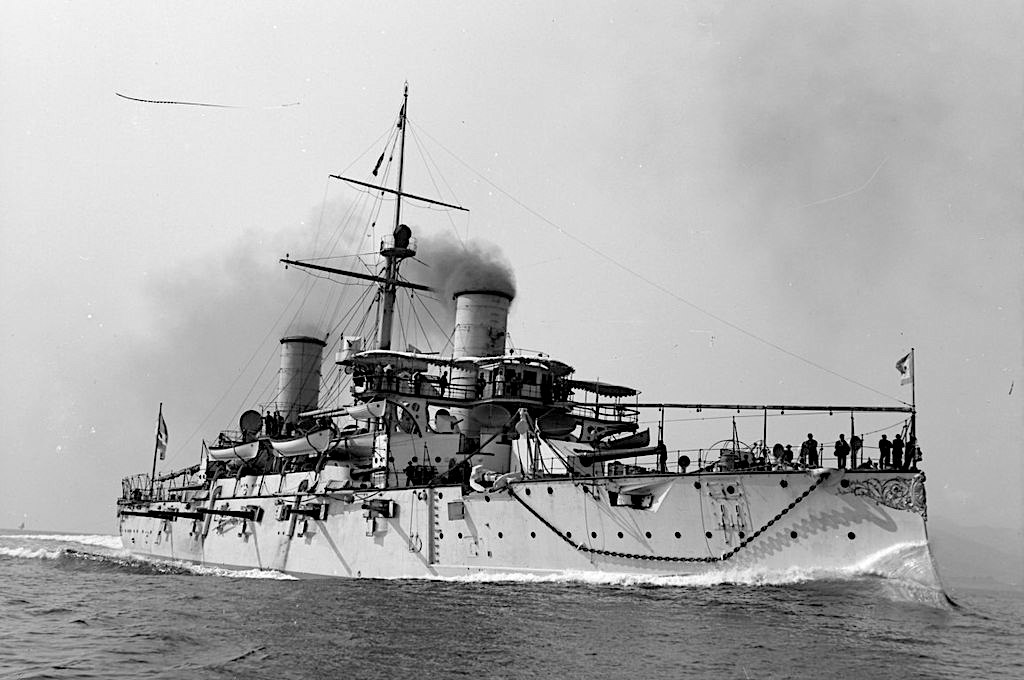
All the Brits prove again that they’re the worlds largest cowards & don’t want to be accused of Assanges MURDER. But then looking at the Brits history from South Africa & India NOBODY should be surprised!
Ralph Waldo Emerson said,
”I hate quotes , tell me what you know”
OK, Mr. Emerson.
I know a really good quote related to Joe Lauria’s 2023 article regarding the “ESPIONAGE ACT”.
Henry David Thoreau said, ”Any fool can make a rule and every fool will mind it”.
The “Espionage Act”-this vile tyranny and corruption of thought, language and just law is just an arbitrary invention for the convenience of tyranny.
In the third grade there was a clever student as my classmate who arbitrarily invented the rule in playing the schoolyard game of marbles.In this game at the beginning of his turn he proclaimed ,,,“BOMB-zees” ,,,Thus he was allowed to stand over your marble and drop his directly over it and thus easily win the possession of it, which only a blind child could fail to do.
Immediately after his win he would officially declare the LAW of… ”NO BOMB-zees”.
My third grade child mind assumed that to be official law and so eventually lost my marbles….all of them.
He gained all of the other students marbles also with the same arbitrary “LAW”.
We third grade students all lost our marbles to an arbitrarily invented “law” by a clever, unscrupulous, empathy and justice challenged and very clever fellow student who later threatened to “tell his father” when the teacher made him give all our marbles back as the result of a justice seeking whistleblower fellow child.
What authority can we appeal to make these clever and deceitful tyrants of state give our liberties and freedom of the press back to us??
Massive general strikes which would likely trigger the horrific violence of our corrupt and tyrannical government?
Is this the “Land of the free” ….or … ” A boot stomping in a human face forever”-(Orwell)
Michael Atwood
It sounds great: The Official Secrets Act – which is why uk governments hang on to it. Of course it would be wrong for a citizen to tell of our military movements: “Hey, Citizens of Agadir! Look out because a British gunboat will be shelling you in the morning”. Of course you should go to jail.
It is, of course, the precursor to ‘1984 all over again’ because, if they think that you might think that you could hold information that might benefit a potential foreign power, you must be guilty. The only word they missed out was ‘whistleblower’, although there were plenty on the railways at the time, but they definitely would have known the word ‘truthteller’ but, then as now, that too would have been just too inconvenient.
A democratic government has always been a “Dream Deferred”
(Langston Hughs), and should the high politic criminals running
the U.S. succeed in extraditing Julian we’ll all see what happens
to it.
Thank you for such a comprehensive look at the history of power suppressing information. Very revealing that it started likely at the beginning of time!
Yes, indeed Many facts about the hypocrisy of politics are little known.
J’espère que Moscou échangera l’espion journaliste Yankee contre Julian Assange.
What a terrific historical review of attempts to muzzle the press in the US. …… this deserves a more careful read later.
The ten year persecution of Assange has already fulfilled a main objective of the US regime. ——> to warn/threaten ANY journalist ANYWHERE in the world to not look too closely at ANYTHING the empire does. And, while the US imperium would welcome the opportunity to put on its show trial of this century’s most consequential journalist, I’d bet the regime hopes/expects/ or plans to see Assange succumb to health issues before he’s ever extradited . He can then continue to be vilified after death without any pushback.
Yep, McCarthyism, 2.0 ………. at least someone spoke up to Joe McCarthy with “sir, have you NO shame?!?!” ……. Today’s political hacks are in lockstep agreement about Assange. The two wings of the Business Party just LOVE them some bipartisanship when it comes to ——> prosecuting war, transferring wealth upwards, massive surveillance of the public, minimizing voices of dissent, …..and goin after journalists who embarrass the US and/or expose its vast crimes. ……….From a corporate media that’s all war/all the time….to….. de-platforming/algorithmically downgrading certain websites…..to….. persecuting/prosecuting Assange, the US regime’s effort to close the American mind and enforce ‘groupthink’ among the masses is commensurate to US decline of global dominance/influence.
“What a terrific historical review of attempts to muzzle the press in the US. …… this deserves a more careful read later.”
Agree shmutzoid. It’s a lot to take in, at just one reading.